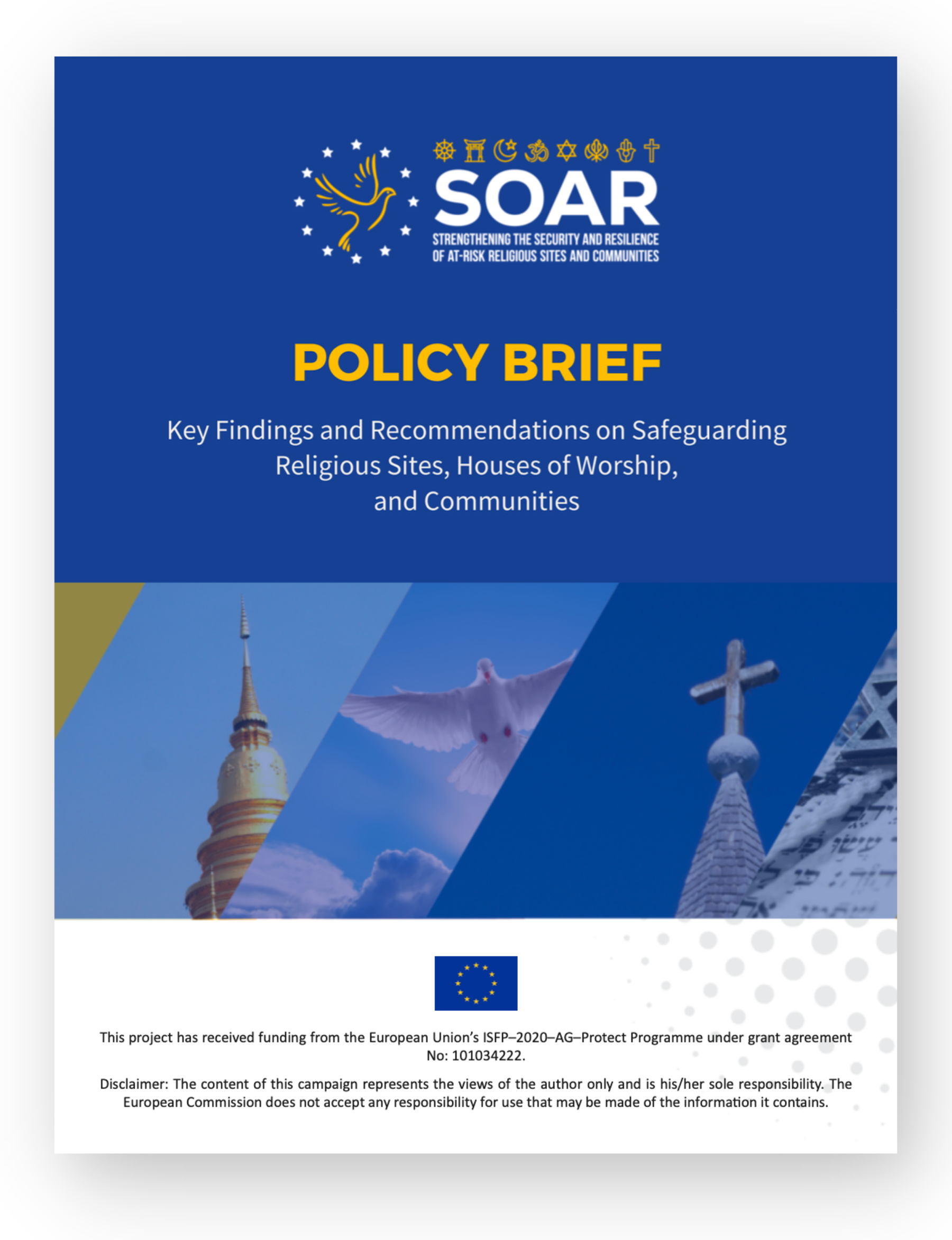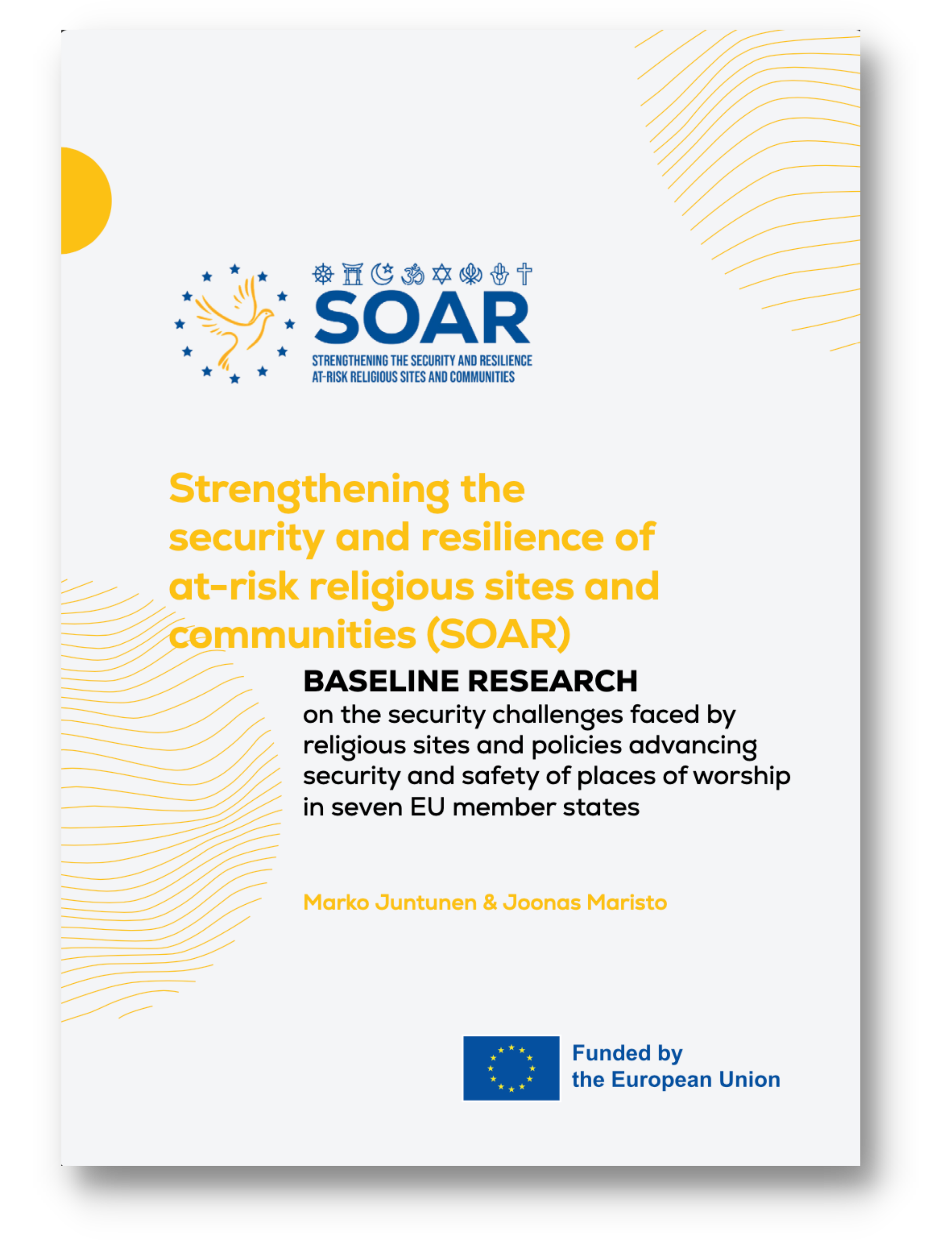SOAR Project – Strengthening the Security and Resilience of At-Risk Religious Sites and Communities
‘Strengthening the security and resilience of at-risk religious sites and communities’ (SOAR) project will contribute to advancing the protection and safeguarding of places for worship, with a focus on communities of worship within the European Union (EU). SOAR is funded and supported by the European Commission and will be delivered by Enhancing Faith Institutions (EFI), the Network for Religious and Traditional Peacemakers, and the Architects’ Council of Europe (ACE).
The main purpose of the project is to increase the awareness of, and capacity to respond to physical and human security threats to places of worship. SOAR will utilize a wide range of communication channels and will provide our audiences with a unique knowledge base. This will include training, guidance, and resources, with the opportunity for virtual engagement and the evolution of virtual networks and communities of practice.
SOAR will undertake primary research to identify the factors that lead to threats of terrorist attacks on places of worship and on at-risk religious communities. Training needs for potential victims of hate crimes will be identified and assessed. Training will be delivered across the full spectrum of the project in EU, national and regional, and local settings, in seven pilot EU member states. It will include a focus on increasing safety awareness and on collaboration and cooperation between places of worship leaders and security officers with their wider communities and public authorities, including law enforcement agencies. The seven pilot countries of the project include France, Germany, Belgium, Poland, Denmark, Hungary, and the Netherlands.
The insights of those with lived experiences of the threat of or of actual terrorist attacks and hate crimes will be engaged to enhance regional level policy-dialogue with regional, EU, and global organizations. These include the European Commission, the United Nations Alliance of Civilisations, and EU member states, to further advance the protection of religious sites and develop a ‘security by design (SBD) ethos. SBD is an integral component of the SOAR program. It is a security ethos that incorporates security features into the design and fabric of the building. Experts in the fields of SBD, community safety, and resilience-building will be providing support and training at a national, regional, and local level to faith institutions in the 7 pilot countries.
The key target beneficiaries include religious leaders, security and facilities officers of places of worship, as well as active women and young people of congregations and faith groups. The project will also seek to engage city-wide law enforcement agencies, responsible for protective security for places of worship and key policymakers at the local, regional, and EU levels.
Women and Youth – Protecting Places of Worship Training Programs

How can women and youth of faith protect themselves in online spaces? How can we ensure places of worship are protected against vandalism, and how can we address and advocate for mental wellbeing? These answers can be more answered through the free safety and security training provided by SOAR.
This is intensive targeted work with a focus on the assessed needs of women and youth with a focus on community safety training for women and young congregants to address the needs of families and young people, acknowledging and developing the important role of informal leadership within faith communities.
Publications
2023
SOAR Policy Brief: Key Findings and Recommendations on Safeguarding Religious Sites, Houses of Worship, and Communities
In light of the rise of hate speech and crimes targeting religious sites and communities across Europe, the SOAR project has become a guiding mechanism on how to safeguard houses of worship and strengthen the collaboration between the European Union(EU) and its member states, security personnel and faith communities. This policy brief offers an analysis of the critical issues discussed in the national policy dialogues and highlights a series of practical recommendations that can serve as an effective framework for the development of future policy initiatives.
2022
Baseline Research: Strengthening the security and resilience of at-risk religious sites and communities
The right to practice faith, and maintain and communicate religious beliefs are fundamental human rights. This report provides information regarding the security of places of worship religious demographics, legislation concerning church-state relations, threat picture, and adopted national policies to mitigate hate crimes.








